When I was in Congress and then governor of West Virginia, in dealing with a major legislative proposal, I learned to look at possible ramifications that were not always being recognized.
The critical decisions Congress will make in the next few months about cutting Medicaid will not affect just health care access. Almost every West Virginian — employer, middle income worker and couples, business owner and state employee —will feel a direct impact.
Despite President Trump’s frequent vows not to cut Medicaid, he supported Congress’s recent budget resolutions with a potential $880 billion in Medicaid reductions over 10 years. This health care blow alone directly threatens over a half million West Virginia children, senior citizens and low and middle income adults. In West Virginia, Medicaid covers 46% of births, 45% of the state’s children’s health care, and almost eight-in-10 senior citizens in nursing homes.
But Medicaid cuts in West Virginia do not just have a ripple effect, they can cause a flood of unintended consequences. Representing almost 6% of West Virginia’s Gross State Product, the annual $5.1 billion Medicaid expenditure is an unsung mainstay of the Mountain State economy.
The state’s delicately balanced budget and the taxpayers will feel an immediate blow. For every federal Medicaid dollar that comes to West Virginia, the state puts up an average of only 20 cents. Match rates vary according to the program, with the most favorable being Medicaid Expansion for low-income adults where every $1 from the state generates $9 in federal contributions for health care and the state economy.
For state and community economic developers, losing these federal funds would be the same as having a major industry announce major layoffs. An economic analysis released last month by the Commonwealth Fund and George Washington University affirms the likely cost to West Virginia in 2026. No public official wants to get the call stating that within a year, almost 6,000 jobs — 3,100 directly from health care and another 2,700 as indirect fallout — will soon be gone. Utilizing the same economic modeling analysis firm as many West Virginia University studies, the report also projects $41 million lost in state tax revenue. Not projected in the study are the additional payments of unemployment benefits and other social welfare needs.
Medicaid revenues affect the economic well-being of every community. Health care is one of the state’s largest employers; 49,000 work in 65 hospitals as well as thousands more in 100 nursing and assisted living facilities, rural health clinics and countless physician’s offices. Each one of these health care workers, usually supported in whole or in part by Medicaid, buys cars, homes, appliances, shops locally, contributes to church and community efforts and pays taxes.
For many struggling West Virginia small business owners who cannot afford health care insurance, Medicaid enables their lower-paid employees coverage for their children, and sometimes for the worker. Sixty-four percent of Medicaid recipients work full- or part-time. As one small business owner told me years ago during a drive to sign families up for the Childrens Health Insurance Program (CHIP), “this helps my business by giving our employees the coverage that I can’t provide.”
The recent, hard-negotiated adjustments for the state employees’ health insurance under the Public Employee’s Insurance Agency (PEIA) could also come undone. If Medicaid, the state’s major health care payer, is reduced, costs go up for all the other payers with PEIA next in line.
Less recognized is the economic freedom that Medicaid provides the loved ones of many West Virginia parents and grandparents. Most senior citizens or disabled relatives in a nursing home or treatment program are covered by Medicaid. Cutting Medicaid may force them to live with relatives, creating additional financial burdens for the state’s younger generation.
In 2018, citing a Kaiser Commission on Medicaid and the Uninsured report, a West Virginia Department of Health and Human Resources publication noted “…that Medicaid spending generates economic activity within the state by providing jobs, personal income, and state tax revenues. … Medicaid is one of the few state government spending opportunities that is guaranteed to pull in money from outside the state and directly benefit the local economy.”
An already uncertain economic future looks even more ominous with looming Medicaid reductions. Congress has passed its budget targets and during the next months must enact the cuts it promised. The congressional budgeting reality is there is not enough funding in other programs to avoid reaching into Medicaid. If that happens, almost every West Virginian — not just Medicaid recipients — will be affected in many ways that are not being discussed.










